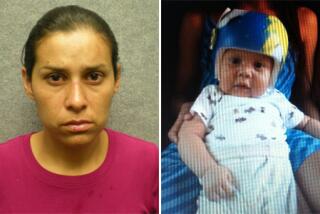Huge Award Doesn’t End Family’s Travail
- Share via
Six-year-old Cynthia Vasquez reigns supreme in the tiny two-bedroom Montebello apartment she shares with her mother, brother, two sisters and grandparents.
La Princesita, they call her. The little princess. She wears fancy handmade dresses. Delicate gold jewelry adorns her ears, neck and thin wrists. She demands, and gets, constant attention. A large photo of her is prominently displayed in the living room high above the TV set, next to the picture of Jesus.
But the girl in the picture, like the girl in the apartment, looks at you with distant, impenetrable eyes, her head hanging limp. She has cerebral palsy, a birth defect that, in the minds of 12 Pasadena Superior Court jurors, was caused by the negligence of the obstetrician who delivered her.
The jurors on Jan. 21 awarded Cynthia $21.8 million over her lifetime, giving the doctor the option of paying it off in one lump sum of $4.7 million.
It was a stunning amount for six adults and one child living together on about $500 a week. But day-to-day life inside the apartment a couple weeks later reminds you that heaven-sent money is often an elusive, if not hollow, reward.
The award is among the 10 largest medical malpractice judgments for birth defects in state history, according to Jury Verdicts Weekly. The family is thinking about buying better medical care for Cynthia, perhaps moving into a larger home. And yet it could be up to two more years--five years after the family filed suit--before Cynthia’s family receives any payments, said Peter J. McNulty, the attorney who represented Cynthia.
Court appeals can convince a judge to reduce the size of awards, said Stanton Price, a lecturer in health care law at Loyola Law School and Cal State Long Beach. Families sometimes voluntarily settle for less to end protracted post-verdict litigation. In addition, courts require parents to prove that expenditures of the award benefit the child.
“It’s not a windfall for the family,” Price said.
The obstetrician, Cecilia T. Lin, who has offices in Montebello and San Gabriel, has not decided whether to appeal the case, her attorney said.
Cynthia’s mother, Guadalupe Dominguez, says that no amount of money can compensate for the fact that the healthy girl she prayed for cannot talk, walk, feed herself or even crawl.
“It’s been very sad,” said the petite, soft-spoken woman, cradling her daughter, a doll-like figure with stiff, sometimes jerking limbs, in her lap. “Cynthia will never have a normal life, to play with other children, to have children of her own someday.”
One recent afternoon, the mother cooed to her 32-pound, 3-foot-4 daughter in Spanish, the only language she speaks: “Do you want some milk? Do you want to eat?”
The girl cocked her head slightly and her eyes rolled toward the kitchen. Her tongue filled her mouth as she cracked into a gaping smile, covering up the bits of metal that have replaced the numerous teeth the family said she lost to cavities.
“She understands,” Dominguez said triumphantly.
The jury awarded Cynthia $250,000 for pain and suffering, the maximum amount allowed under a state medical malpractice law. But it awarded $12.8 million for her future medical care and rehabilitation and $8.8 million for the loss of earnings over her lifetime, according to court documents.
Of that, about $900,000 will go toward attorney’s fees and court costs. If the defendant chooses to pay in a lump sum, it would leave less than $4 million for Cynthia and her family, provided the amount isn’t reduced by an appeal or settlement.
But the family is already making plans to improve the life of La Princesita. They want to supplement Medi-Cal, which doesn’t pay for all the medicine that Cynthia needs, said Ana Ramirez, her 21-year-old sister. They want Cynthia to have more physical therapy, perhaps speech therapy, too.
They hope to buy a van with a hydraulic lift so they can take Cynthia out in her wheelchair as she grows up.
Looking down at the worn carpet, Dominguez said she’d also like to move to a house with a grassy yard so her children could take Cynthia out to play. The courtyard of their apartment complex is made of concrete. Bathroom plumbing has been broken for a year. Here and there, walls are broken, paint is peeling.
The nightmare began when Dominguez, then 38 weeks pregnant, was admitted to Garfield Medical Center with vaginal bleeding and high blood pressure. Three days later, while she was still hospitalized, she was found unconscious and in respiratory arrest. Medical personnel revived her, but a subsequent Caesarean section produced a baby that was not breathing, had no reflexes and no heart rate.
McNulty contended that Dominguez had preeclampsia, a threat to the fetus that warranted immediate delivery when Dominguez was admitted, but that obstetrician Lin negligently chose to wait, which caused Cynthia’s brain damage.
Lin’s attorney, George T. McDonald, argued that Dominguez did not have preeclampsia but rather amniotic fluid embolism, a condition outside the doctor’s control in which fluids enter the mother’s heart and lungs, causing the organs to stop functioning. The jury unanimously sided with Cynthia’s family.
Dominguez said that within days of Cynthia’s harrowing birth, she knew something was wrong with her newborn. Cynthia had trouble eating, and she had to massage the baby’s cheeks and throat to get her to swallow. Over the following weeks, Dominguez said, “she would just lie there and not move.” The single mother, a seamstress before the baby was born, began to realize that caring for Cynthia would become not only her new full-time job, but also her life.
Today, Cynthia laughs and cries, but she has not yet spoken a word. She’ll likely remain in diapers her entire life. Doctors have told Dominguez that people with cerebral palsy have been known to live into their 80s.
The family’s days are filled with small battles. Cynthia must be fed six times a day; it takes an hour each time to get her to swallow her pureed meals. The girl screams whenever she is alone, so every night either Ana or Dominguez sleeps with the girl on the double bed in the room they share with Maria Ramirez, Cynthia’s 18-year-old sister who has the twin-size bed. Whoever doesn’t sleep with Cynthia sleeps in the other bedroom with the grandparents. Cynthia’s brother, Adolfo Ramirez, who works the graveyard shift putting labels on boxes, sleeps on the double bed during the day. Adolfo is the main breadwinner, bringing home about $250 a week. Cynthia and her mother receive about $1,100 a month combined in Supplemental Security Income for the girl’s disability.
Ana has deferred college to help care for Cynthia. Maria and the grandparents take turns watching her.
Propping up Cynthia’s listless head with one hand, Dominguez dabbed the girl’s mouth with the other and considered how little a difference money makes. It will not change the family, already close-knit, and it will not change Cynthia.
“If I could change things,” the mother said, “I would rather have the health of my daughter.”
More to Read
Sign up for Essential California
The most important California stories and recommendations in your inbox every morning.
You may occasionally receive promotional content from the Los Angeles Times.













